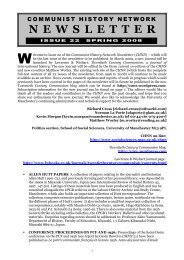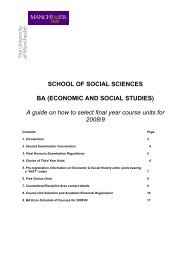POLI20532 Course Outline 1112 - School of Social Sciences
POLI20532 Course Outline 1112 - School of Social Sciences
POLI20532 Course Outline 1112 - School of Social Sciences
Create successful ePaper yourself
Turn your PDF publications into a flip-book with our unique Google optimized e-Paper software.
<strong>POLI20532</strong>: <strong>Course</strong> Guide 2011-12<br />
2012 Lecture & Tutorial Programme<br />
Attendance at tutorials is compulsory. You are expected to make every effort to attend all tutorials<br />
on this course. If you know in advance that circumstances beyond your control will prevent you from<br />
attending a tutorial, you should contact the tutor with this information. If you are unable to do this,<br />
you should explain your absence as soon as possible. You should not wait to be contacted by the<br />
course tutor(s) for non-attendance. Unexcused absences can lead to unsatisfactory tutor’s reports at<br />
the end <strong>of</strong> the course (affecting future job references by other tutors), and may result in exclusion<br />
from this course or in refusal to allow you to resit a failed exam.<br />
Lectures take place on Mondays, 1-3 p.m., Chaplaincy Theatre, St Peter’s House.<br />
Lecture notes and/or slides will be made accessible via Blackboard in the week before the lecture.<br />
Introductory week:<br />
Lecture. 30 January 2012<br />
Introduction<br />
Part one: an age <strong>of</strong> consensus? 1940-64<br />
Week 2<br />
Lecture. 6 February 2012<br />
(i)<br />
(ii)<br />
The emergence <strong>of</strong> consensus? (KM)<br />
Politics and social change in 1940s Britain (AR)<br />
Tutorial:<br />
To what extent did Labour’s victory in 1945 represent the emergence <strong>of</strong> a new political<br />
consensus in Britain? Is this best characterised as a social-democratic consensus?<br />
Week 3<br />
Lecture: 13 February 2012<br />
(i)<br />
(ii)<br />
The British Labour tradition: ethos, organisation, ideology (KM)<br />
The Attlee Governments (AR)<br />
Tutorial:<br />
Were the Attlee governments the ‘most successful exponent <strong>of</strong> the British variant <strong>of</strong><br />
democratic socialism’ (K.O. Morgan)? What was the British variant <strong>of</strong> democratic<br />
socialism?<br />
Week 4<br />
Lecture: 20 February 2012<br />
(i)<br />
The British conservative tradition: ethos, organisation, ideology (KM)<br />
(ii)<br />
Butskellism and affluence: Conservative Britain 1951-64 (KM)<br />
Tutorial:<br />
Was an age <strong>of</strong> affluence inevitably an age <strong>of</strong> Conservatism? Or is it a mark <strong>of</strong><br />
Conservative success that we think <strong>of</strong> the 1950s as an age <strong>of</strong> affluence?<br />
Part two: the fraying <strong>of</strong> consensus 1964-79<br />
Week 5<br />
Lecture: 27 February 2012<br />
(i)<br />
(ii)<br />
The challenge <strong>of</strong> modernisation: the Wilson years 1964-70 (KM)<br />
The challenge <strong>of</strong> modernisation: the Heath experiment 1970-4 (AR)<br />
5
















